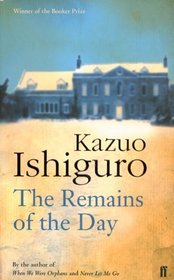Helpful Score: 11
An elderly English butler, having received the suggestion that he borrow his new employer's car and 'get out and see the country', decides to go visit a former housekeeper, who worked with him. The reader is initially unsure of their relationship, but a romantic interest is implied (although denied by the narrator.)
Gradually, through his internal thoughts, we begin to see that his stated pride in the traditions of skilled service are a hollow shell, that his former employer was not the paragon of nobility that he had hoped and believed he was, and that he feels his life was likely wasted. He remains unable to engage in regular human interaction, finding even the interactions of other servants with similar backgrounds nearly impossible to understand.
I haven't seen the movie that was made of this book, but it seems a very strange choice for film adaptation, as most of the significant aspects of the novel are in the mind of the main character.
The book however, is an excellent character study, beautifully written. It does remind me of another of Ishiguro's novels, "An Artist of the Floating World." Although the characters in each book are very different from each other, they both deal with a similar sort of self-denial and shame.
Gradually, through his internal thoughts, we begin to see that his stated pride in the traditions of skilled service are a hollow shell, that his former employer was not the paragon of nobility that he had hoped and believed he was, and that he feels his life was likely wasted. He remains unable to engage in regular human interaction, finding even the interactions of other servants with similar backgrounds nearly impossible to understand.
I haven't seen the movie that was made of this book, but it seems a very strange choice for film adaptation, as most of the significant aspects of the novel are in the mind of the main character.
The book however, is an excellent character study, beautifully written. It does remind me of another of Ishiguro's novels, "An Artist of the Floating World." Although the characters in each book are very different from each other, they both deal with a similar sort of self-denial and shame.
One of my favorite books by Ishiguro. He captures 1930s and 40s life in a British country house with a large staff so well that it is hard to believe this book wasn't written then.
Helpful Score: 3
One of the best examples of an 'unreliable narrator' in contemporary fiction. This is one of my favorite books of all time.
Helpful Score: 3
Don't be fooled by the name: Kazuo Ishiguro emigrated to Britain at age 5 and The Remains of the Day is written in a style completely in keeping with that of an impeccable English butler. In the summer of 1956, Stevens ventures out on a motoring holiday to the West Country when his new American employer is not in residence. During the trip, he ponders over his life in service to Lord Darlington and his working relationship with the former housekeeper, Miss Kenton, whom he calls on towards the end of the journey. As the title implies, the story concerns itself with the past; even very few details of the journey are related as it is happening. This is an intense character study of one who considers himself foremost a consummate professional, as well as a a study of class in British society. There are hints of sadness in this reflective work which I found deserving of its 1989 Booker Prize and a space on the list of 1001 Books You Must Read Before You Die.
Kristin L. (beautyredefined) reviewed The Remains of the Day (FF Classics) on + 32 more book reviews
Helpful Score: 3
This book was different from what I expected - knowing nothing about the author beforehand, I didn't quite expect a novel about a British butler. Nonetheless, Ishiguro develops this character tremendously well, and I was impressed how well his butler seemed to fulfill my notions of the great English butlers of the past. As Mr. Stevens embarks on a road trip to visit a past employer and friend, he is constantly troubled by memories of his past and his role in international affairs. At first, his memories are pleasant recollections of the glory days of Darlington hall, but he realizes that all was not as it seemed.
For fear of ruining the ending, I won't say much more, but this book really comes together in the last chapter and a half or so. Up until then, I found this a slower read than I was used to, and Mr. Stevens somewhat vagrant tales could be tiring, but all of the set-up is worth it for the end. At times heartbreaking, and at others hopeful, I think this book is definitely one to read at least once.
For fear of ruining the ending, I won't say much more, but this book really comes together in the last chapter and a half or so. Up until then, I found this a slower read than I was used to, and Mr. Stevens somewhat vagrant tales could be tiring, but all of the set-up is worth it for the end. At times heartbreaking, and at others hopeful, I think this book is definitely one to read at least once.




